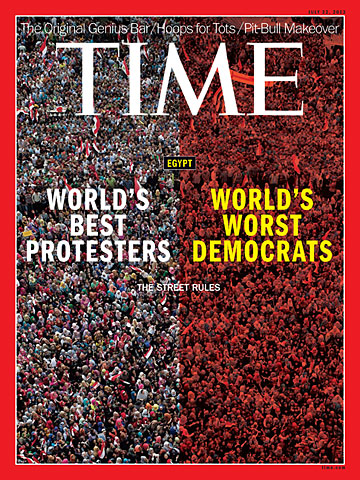
(5 of 6)
Rather than yield a new government, the coup could bring back elements of the old, pre--Arab Spring order. In the early actions of the transitional government, it was easy to see echoes of the security state that ruled Egypt for most of the past century. Three TV stations have been shuttered, more than a dozen senior Brotherhood officials have been detained, and the rest are looking over their shoulders. "Let's be honest," says Radwa el-Sharkaway, another Tamarod activist. "The army has controlled the country for centuries."
But there is also talk of a new beginning, the buds of which were just visible in the extraordinary outpouring of joy that greeted Morsi's removal. It happened, of course, in the streets--filled not with protesters but with families, tens of thousands hanging from cars moving at a walking pace, if they moved at all. Everyone had a flag, and everyone had a smile for a stranger. It wasn't only that the Brotherhood had lost. There was also a sense that something had been won. "He made us love each other more," Ravia George says the next night in Tahrir, giving Morsi his due while dodging ash from a Roman candle. "I'm feeling happiness and the love that's been missing in the past year."
That feel-good factor, says Wael Nawara, co-founder of ElBaradei's Constitution Party, is an important reason it makes sense for Egyptians to effect political change through mass demonstrations: "People like operating in this collective manner, in this connected manner." And if the protests produced strange bedfellows--young liberals and Mubarak loyalists, secular activists and ultra-conservative Islamists from the Nour Party--then so be it. "We need to believe in the good nature of people and build a better system," he says.
The next move--and it is sure to come in the streets--belongs to the Brotherhood. It is unlikely to go gently into the night: it remains the country's single largest political force, and it has a well-deserved reputation for organizational discipline. It may now be reeling from the shock of losing power, the arrest of top leaders and the killing of supporters, but it will not reel for long. "I believe we will continue as we have continued for 80 years," says Darrag, the former minister.
The Brotherhood too has learned the lesson of July 3: politics in Egypt is not about winning votes as much as it is about assembling the largest crowd. And as the anti-Morsi groups continue to lay claim to Tahrir Square, the Brotherhood has opted to re-create that experience outside the Raba'a Adawiya mosque in Nasr City. It's not quite a square, but the Brotherhood have long since declared it "our Tahrir," taking over and fortifying the surrounding blocks. On July 10, as thousands of Morsi supporters continued their open-ended sit-in, the mood is listless--understandable on the first day of Ramadan, the holy month when devout Muslims abstain from all food and drink before sunset. A few hundred brave souls attempt to stage an angry march. But most sit out the mid-day heat by dozing or reading the Koran in the shade. Volunteers spray people with mist to keep things cool, and the communal kitchens cook up huge vats of rice and boiled chicken for the sunset meal.
